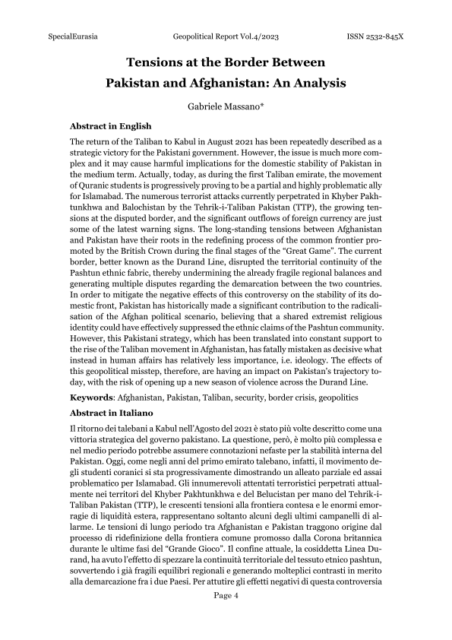
Title: Tensions at the Border Between Pakistan and Afghanistan: An Analysis
Publication: Geopolitical Report ISSN 2532-845X
Authors: Gabriele Massano
Citation: Gabriele Massano, “Tensions at the Border Between Pakistan and Afghanistan: An Analysis
”, Geopolitical Report ISSN 2532-845X, Vol.4, 2023, pp. 4-14
Abstract in English
The return of the Taliban to Kabul in August 2021 has been repeatedly described as a strategic victory for the Pakistani government. However, the issue is much more complex and it may cause harmful implications for the domestic stability of Pakistan in the medium term. Actually, today, as during the first Taliban emirate, the movement of Quranic students is progressively proving to be a partial and highly problematic ally for Islamabad. The numerous terrorist attacks currently perpetrated in Khyber Pakhtunkhwa and Balochistan by the Tehrik-i-Taliban Pa-kistan (TTP), the growing tensions at the disputed border, and the significant outflows of foreign currency are just some of the latest warning signs. The long-standing tensions between Afghanistan and Pakistan have their roots in the re-defining process of the common frontier promoted by the British Crown during the final stages of the “Great Game”. The current border, better known as the Durand Line, disrupted the territorial continuity of the Pashtun ethnic fabric, thereby undermining the already fragile regional balances and generating multi-ple disputes regarding the demarcation between the two countries. In order to mitigate the negative effects of this controversy on the stability of its domestic front, Pakistan has historically made a significant contribution to the radicalisa-tion of the Afghan political scenario, believing that a shared extremist religious identity could have effectively suppressed the ethnic claims of the Pashtun community. However, this Pakistani strategy, which has been translated into constant support to the rise of the Taliban movement in Afghanistan, has fatally mistaken as decisive what instead in human affairs has relatively less im-portance, i.e. ideology. The effects of this geopolitical misstep, therefore, are hav-ing an impact on Pakistan’s trajectory today, with the risk of opening up a new season of violence across the Durand Line.
Keywords: Afghanistan, Pakistan, Taliban, security, border crisis, geopolitics.
Abstract in Italiano
Il ritorno dei talebani a Kabul nell’Agosto del 2021 è stato più volte descritto come una vittoria strategica del governo pakistano. La questione, però, è molto più complessa e nel medio periodo potrebbe assumere connotazioni nefaste per la stabilità interna del Pakistan. Oggi, come negli anni del primo emirato talebano, infatti, il movimento degli studenti coranici si sta progressivamente dimostrando un alleato parziale ed assai problematico per Islamabad. Gli innumerevoli attentati terroristici perpetrati attualmente nei territori del Khyber Pakhtunkhwa e del Belucistan per mano del Tehrik-i-Taliban Pakistan (TTP), le crescenti tensioni alla frontiera contesa e le enormi emorragie di liquidità estera, rappresentano soltanto alcuni degli ultimi campanelli di allarme. Le tensioni di lungo periodo tra Afghanistan e Pakistan traggono origine dal processo di ridefinizione della frontiera comune promosso dalla Corona britannica durante le ultime fasi del “Grande Gioco”. Il confine attuale, la cosiddetta Linea Durand, ha avuto l’effetto di spezzare la continuità territoriale del tessuto etnico pashtun, sovvertendo i già fragili equilibri regionali e generando molteplici contrasti in merito alla demarcazione fra i due Paesi. Per attutire gli effetti negativi di questa controversia sulla stabilità del proprio fronte interno, il Pakistan ha storicamente fornito un contributo rilevante alla radicalizzazione dello scenario politico afghano, nella convinzione che una comune identità religiosa oltranzista avrebbe potuto sopire le rivendicazioni etniche della comunità pashtun. La tattica pakistana, tradottasi in un costante sostegno all’ascesa del movimento dei talebani in Afghanistan, ha però fatalmente scambiato per decisivo ciò che invece assume un peso relativo nelle vicende umane: l’ideologia. Gli effetti di questa sgrammaticatura geopolitica incidono oggi sulla traiettoria del Pakistan e rischiano di aprire ad una nuova stagione di violenze a cavallo della Linea Durand.
Parole chiave: Afghanistan, Pakistan, talebani, sicurezza, crisi delle frontierie, geopolitica.
Author Bio
Gabriele Massano is a young geopolitical analyst specialising in issues and scenarios concerning the Middle Eastern region. In parallel with a solid academic background, he has hands-on experience about the majority of the areas he writes about, having travelled around the most disparate parts of the globe and in countries at high risk of political instability. He holds a master’s degree in International Relations and Security from the University of International Studies of Rome, and a bachelor’s degree in Political and Social Sciences from the University of Turin. Moreover, thanks to his postgraduate specialistic studies at the School of Domino, he has assimilated a solid method of geopolitical analysis focused on history, collective psychology and power ambitions of human aggregations, aimed at transcending the mere news report in order to focus on the root causes of international events. Currently, he holds the position of geopolitical analyst at Istituto Analisi Relazioni Internazionali (IARI) and he is enrolled in a PhD Preparatory Program at the International University College of Turin, focused on the development of a comparative framework aimed at forecasting future global scenarios. Finally, he has very in-depth knowledge about Afghanistan and he is now trying to develop several humanitarian projects focused on education in the country.
